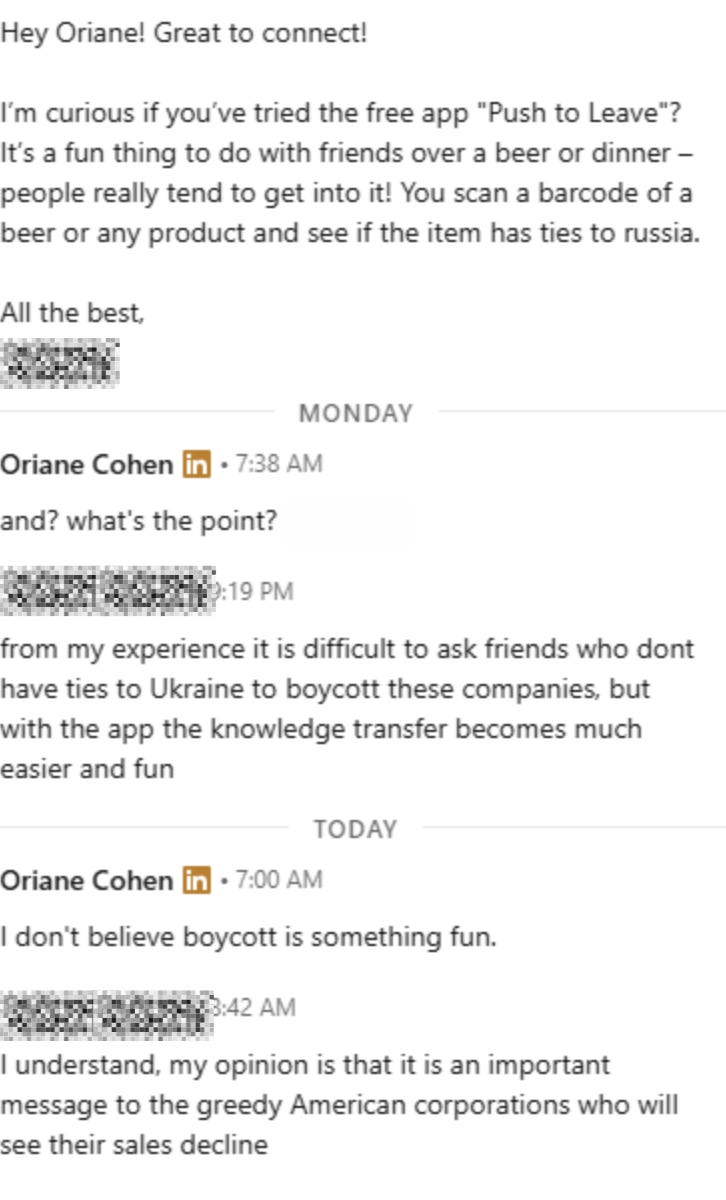They let people believe they’re making a difference when, in reality, they’re doing nothing of substance.
Recently, I received a private message on LinkedIn:

It sounds innocent, even friendly.
But this message is deeply hypocritical.
Why this message is problematic
First of all, the first message hides its true purpose.
Instead of saying, “This app is for boycotting companies linked to Russia,” it tries to make it sound like a game. Calling it “fun thing to do with friends over a beer” is manipulative. If you believe in a cause, why disguise it as entertainment? I had to ask a “straight-to-the-point” question for him to tell me the word “boycott”.
Second, it pressures you to join the crowd.
“People really tend to get into it!”. This is classic peer pressure. The message is designed to make you feel like you’re missing out if you don’t participate.
Lastly, it’s a stupid view of a complex issue.
As if scanning a barcode at the supermarket somehow makes you an activist... Global politics and economics don’t work that way.
With that in mind, let’s talk about why boycotts are pointless.
Why boycotts don’t work
Boycotts sound like a powerful tool, but in reality, they rarely achieve their intended effect. Because…
1. The world is too connected for boycotts to work
Big companies today operate across multiple countries, with suppliers, factories, and partnerships all over the world. For example:
- A company might leave Russia officially but still sell products there through third-party distributors.
- Some companies that stayed in Russia are actually major employers in Western countries. Boycotting them could hurt people in your own country more than in Russia.
2. They hurt “regular people” more than governments
When companies pull out of a country, the ones who suffer most are their employees, ordinary people who have nothing to do with government decisions.
Boycotts make life harder for citizens while authoritarian leaders find other ways to keep their economies running. If anything, it pushes them to become more independent and less influenced by the outside world. And as a consequence…
3. …they don’t weaken governments, they create new alliances
When Western companies left Russia, Russia didn’t collapse. Instead, some other strong nations took their place in that game. Now, Russia is trading more with these countries than ever before.
So what did the boycotts actually achieve? They weakened Western influence and pushed Russia into the arms of other powerful nations.
Is it a good or a bad thing? That might be, one day, the subject of another article.
4. Boycotts encourage a dangerous public-shaming culture
Apps like this promote a culture of digital witch-hunting.
People are encouraged to judge each other based on what they buy.
Scanning barcodes might feel like activism, but it doesn’t change anything.
It might even promote misinformation.
Stay critical and ask yourself: who is behind this app? who is financing it? are the listed companies really supporting Russia, or is the data inaccurate?
I don’t have the answer - I’m asking.
The psychology of boycotts (why people LOVE them)
Boycotts are appealing… They make people feel powerful without requiring real effort. They tap into… emotional and cognitive biaises.
The desire for moral superiority. People want to believe they are “on the right side” without making meaningful sacrifices.
The illusion of control. Boycotts provide a false sense of personal impact.
Social validation. Participating in a boycott can be a way to gain approval from peers, especially on social media.
This explains why movements like this spread so quickly despite their lack of impact.
A stronger alternative to boycotts
If the goal is to pressure governments or corporations to act ethically, boycotts aren’t the way. Here’s what actually works:
- Economic policies, targeted sanctions applied strategically by governments, not random consumer decisions.
- Diplomatic pressure or engaging with industries to create real accountability instead of severing ties completely.
- Supporting ethical businesses, instead of just punishing "bad" ones.
Boycotts like these are feel-good activism.
They let people believe they’re making a difference when, in reality, they’re doing nothing of substance.
Worse, they can actually harm the people they claim to help.

